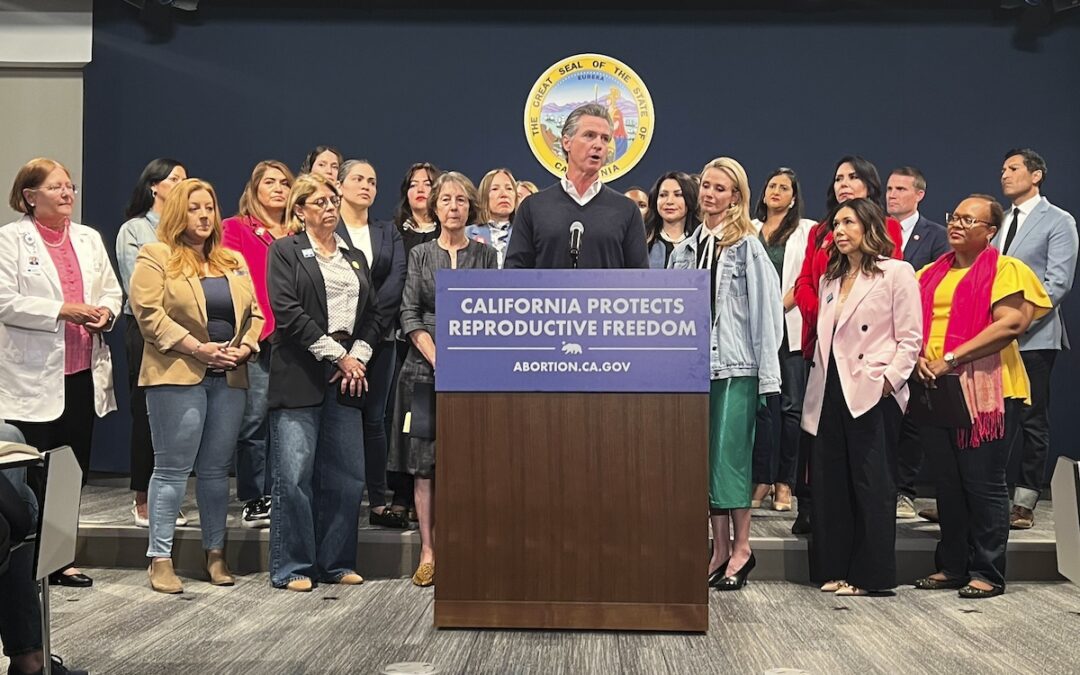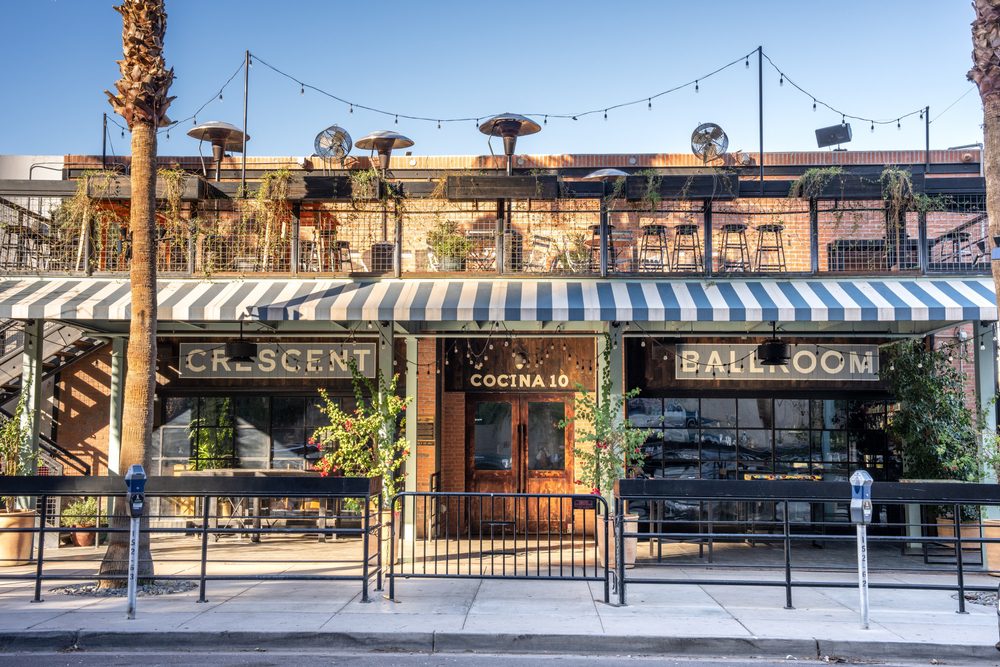
Gayle Shanks, co-owner of Changing Hands Bookstore in Tempe, speaks against special ballot propositions 301, 302 and 303 on March 20, 2023, in Tempe. The propositions will appear on a special election ballot in May in Tempe and, if passed, would make the Arizona Coyotes arena and entertainment district possible. (Photo by Drake Presto/Cronkite News)
“All the rest of us have to pay more into schools and community colleges and hospitals than do the Coyotes.”
Tempe residents in May will have the chance to vote on three propositions that would pave the way for an entertainment district that opponents say would ignore the needs of the community.
The $2.1 billion development at the northeast corner of Priest Drive and Rio Salado Parkway would include an arena for the Arizona Coyotes hockey team, housing, retail space, and more.
The ballot for the May 16 special election asks voters to weigh in on:
- Proposition 301, which amends the city’s General Plan to allow the land to be reclassified from “commercial” to “mixed-use.”
- Proposition 302, which amends the city’s zoning laws to allow for the building of the development.
- Proposition 303 authorizes Tempe Mayor Corey Woods to enter into the developer agreement with Bluebird Development LLC, owned by Coyotes owner Alex Meruelo.
A volunteer group of residents called Tempe 1st is sounding the alarm: They believe voters should oppose the measures and the development as the current proposal stands.
Concerns About Affordability
Former Tempe councilmember Lauren Kuby, a member of Tempe 1st, is against the Tempe Entertainment District for many reasons, including the strain it would put on affordability in the area.
Kuby pointed out that developers in the $1.8 billion Pier 202 project are putting over $10 million into the city’s Affordable Housing Fund. The Coyotes project would only contribute $2 million, an amount Kuby called “very small.”
RELATED: How Shipping Containers Are Being Used to Increase Housing in Phoenix
By Arizona law, municipalities can’t require developers to include affordable housing in their projects, but developers can agree to it in their proposals.
The Coyotes agreement states the development will include up to 2,100 housing units, but none of them are designated as affordable. According to Zillow, the median rent in Tempe as of March 22 was $2,270.
Excessive Noise
Kuby said that’s actually probably for the best because of another issue the project brings up: The development would be built in the flight path of Phoenix Sky Harbor International Airport, exposing anyone who lives there to airplane noise.
The developer agreement requires housing to include sound insulation that keeps indoor noise levels within Federal Aviation Administration (FAA) requirements.
But the FAA does not support residential development on the land and wrote in a letter to the city of Tempe that insulation would not protect residents from loud aviation noise outside or with windows open.
“I understand why we can’t have affordable housing there actually,” Kuby said. “Because under FAA rules it would be considered—and this isn’t a subjective statement, just objectively—it would be environmental racism, because you’d be putting families that are disproportionately people of color into an area, or disproportionately poor into an area that has terrible sound, terrible noise.”
Extra Taxes
Members of Tempe 1st are also concerned about just how expensive it would be for residents to even shop or eat in the district: The agreement allows the developer to impose an up to 6% tax surcharge on transactions made there.
The developer agreement with the city states the district plans to generate $13.5 billion in on-site spending and create nearly 3,300 full-time jobs. But Dawn Penich-Thacker, an Arizona State University professor and cofounder of Save Our Schools, said increasing costs in the area will make it so that people who work service jobs at the area wouldn’t be able to actually live nearby.
“Gosh, you’re going to have to live in Apache Junction to drive into Tempe to work at the Tempe Entertainment District, which you can’t afford to live, eat, or shop at,” Penich-Thacker said.
Kuby said the surcharge would also discourage independently owned small businesses from the district because they would have to pass those charges on to the customer.
“These aren’t going to be businesses that reflect our Tempe community,” she said. “It’s going to be the big box stores that can afford to really pay those business assessments and survive over the long term.”
Tax Breaks
The developer agreement states the project will generate $350 million from sales taxes and $40 million in property taxes over the next three decades.
But opponents point out that the proposal would let the Coyotes’ billionaire owner Meruelo avoid paying taxes on the residential and retail development for eight years, while the arena is off the hook for property taxes for 30 years. That’s a loss of nearly $500 million in tax revenue.
“That is an enormous drain from not only Tempe’s general fund budget, but from the county and the state,” Kuby said. “That means that all the rest of us have to pay more into schools and community colleges and hospitals than do the Coyotes.”
Gayle Shanks, co-owner of Changing Hands Bookstore and member of Tempe 1st, said it’s not fair for Mereulo and developers to claim the project is being fully funded on their own dime when they are receiving these tax breaks.
“Our schools are underfunded right at this moment and they rely on property taxes to get a huge portion of their funding,” Shanks said. “And if this property is going to be not taxed and not valued as a property in Tempe, and consequently there will be no property taxes assessed, then those monies that would be assessed for another business or another entity that’s there, will just not go to the schools.”
This story is part one of a series about the proposed Tempe Entertainment District and the upcoming special election in May.
Looking for the latest Arizona news? Sign up for our FREE daily newsletter.
Politics

Gov. Gavin Newsom wants to let Arizona doctors provide abortions in California
California law generally allows abortion up to the point of fetal viability, which is around 24 weeks. SACRAMENTO, Calif. (AP) — Arizona doctors...

VIDEO: Arizona Attorney General Kris Mayes indicts 18 ‘fake electors’
@coppercourier An Arizona grand jury has indicted former President Donald Trump's chief of staff, Mark Meadows, lawyer Rudy Giuliani, and 16...
Local News

Escape the heat at these indoor pools in Tucson
Arizona: it's synonymous with sunny. Mix that sun with the sprawling urban blacktops and the result is the nationally recognized heat that is...

We asked, you answered: 7 music venues in Arizona for a more intimate show
The biggest artists in the world come to Arizona to perform at places like Footprint Center, State Farm Stadium, and Desert Diamond Arena. But what...





